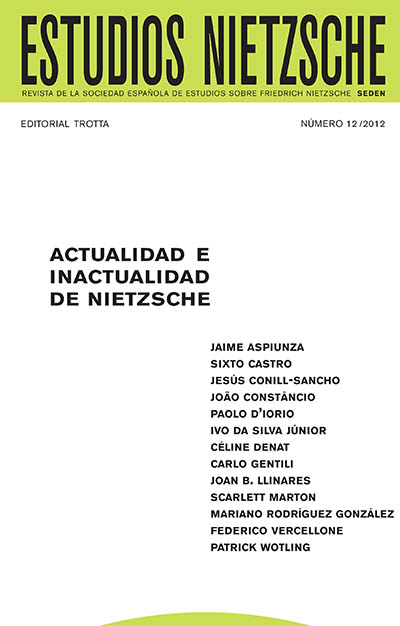Nietzsche: ¿Political or Apolitical?
DOI:
https://doi.org/10.24310/EstudiosNIETen.vi12.10558Keywords:
great politics, will to power, aristocratic, moralAbstract
Although there is no proper political doctrine in Nietzsche, his thought certainly has a political dimension. Since the II Untimely Consideration on history Nietzsche appears to be taking a stance towards the situation of his time. Afterwards, in the very same concept of «will to power» society, ethics, physical world and political world are strictly connected. The concept of great politics has a central role, even if it has a primarily moral connotation. In general, one could say that the political sense of Nietzsche’s philosophy always derives
from his moral ideas. He considers his personal destiny corresponding to Europe’s destiny. In his late works he deals with the concept of «aristocratic», which has to be understood as an aristocracy of the spirit rather than a social or political classification
Downloads
Metrics
References
Ansell-Pearson, K., An Introduction to Nietzsche as Political Thinker. The Perfect Nihilist, Cambridge: Cambridge UP, 1994.
Aschheim, S. E., The Nietzsche Legacy in Germany 1890-1990, Berkeley/Los Angeles/London: University of California Press, 1992.
Burckhardt, J., Die Kultur der Renaissance in Italien. Ein Versuch, en Gesammelte Werke, vol. III, Basel: Schwabe, 1955.
Colli, G., Dopo Nietzsche, Milano: Adelphi, 1974.
Escobar, R., Nietzsche e la filosofia politica del XIX secolo, Milano: il Formichiere, 1978.
Gentili, C., Nietzsche, Madrid: Biblioteca Nueva, 2004.
Gerhardt, V., Pathos und Distanz. Studien zur Philosophie Friedrich Nietzsches, Stuttgart: Reclam, 1988.
Heidegger, M., Nietzsche, Pfullingen: Neske, 1961 .
Losurdo, D., Nietzsche, il ribelle aristocratico. Biografia intellettuale e bilancio critico, Torino: Bollati Boringhieri, 2002.
Lowith, I., Jacob Burckhardt. Der Mensch inmitten der Geschichte, en Samtliche Schriften, vol. 7, Stuttgart: Metzler, 1984.
Mann, Th., Betrachtungen eines Unpolitischen, Frankfurt a.M.: Fischer, 1983.
Müller-Lauter, W., Nietzsche-Interpretationen I. Über Werden und Wille zur Macht, Berlin-New York: de Gruyter, 1999.
Nietzsche, F., Obras Completas, I-IV (OC ). Director ed. Diego Sánchez Meca. Madrid: Tecnos, 2011-2016
Nietzsche, F., Correspondencia I-VI. (CO). Director ed. Luis E. de Santiago Guervós. Madrid : Trotta, 2005- 2012.
Nietzsche, F., Fragmentos Póstumos I-IV (FP). Director ed. Diego Sánchez Meca. Madrid: Tecnos, 2006-2010.
Ottmann, H., Philosophie und Politik bei Nietzsche, Berlin/New York: de Gruyter, 21999.
Rehmann, J., Postmoderner Links- Nietzscheanismus. Deleuze & Foucault. Eine Dekonstruktion, Bonn: Argument, 2004.
Shaw, T., Nietzsche's Political Skepticism, Princeton/Oxford: Princeton UP, 2007.
Siemens, H. W., y V Roodt (eds.), Nietzsche. Power and Politics, Berlin/New York: de Gruyter, 2008.
Vaihinger, H., Nietzsche als Philosoph, Berlin: Reuther & Reichard, 1902.
Downloads
Published
How to Cite
Issue
Section
License
As of issue 21 (2021) this journal is published only in open access (diamond route).
From that number 21, like the previous numbers published in NIETZSCHE STUDIES, they are subject to the Creative Commons Acknowledgment-NoComercia-ShareIgual 4.0 license, the full text of which can be consulted at <http://creativecommons.org/licenses/by-nc-sa/4.0 >
It is the responsibility of the authors to obtain the necessary permissions of the images that are subject to copyright.
This work is licensed under a Creative Commons Attribution-NonCommercial-ShareAlike 4.0 International License.
Copyright generates two different rights: moral rights and patrimonial rights that EJFB recognizes and respects. Moral rights are those relating to the recognition of the authorship. They are rights of a personal nature that are perpetual, inalienable, unseizable and imprescriptible as consequence of the indivisible union of the author and his/her work.
Patrimonial rights are those that can be derived from the reproduction, distribution, adaptation or communication of the work, among others.







11.png)
